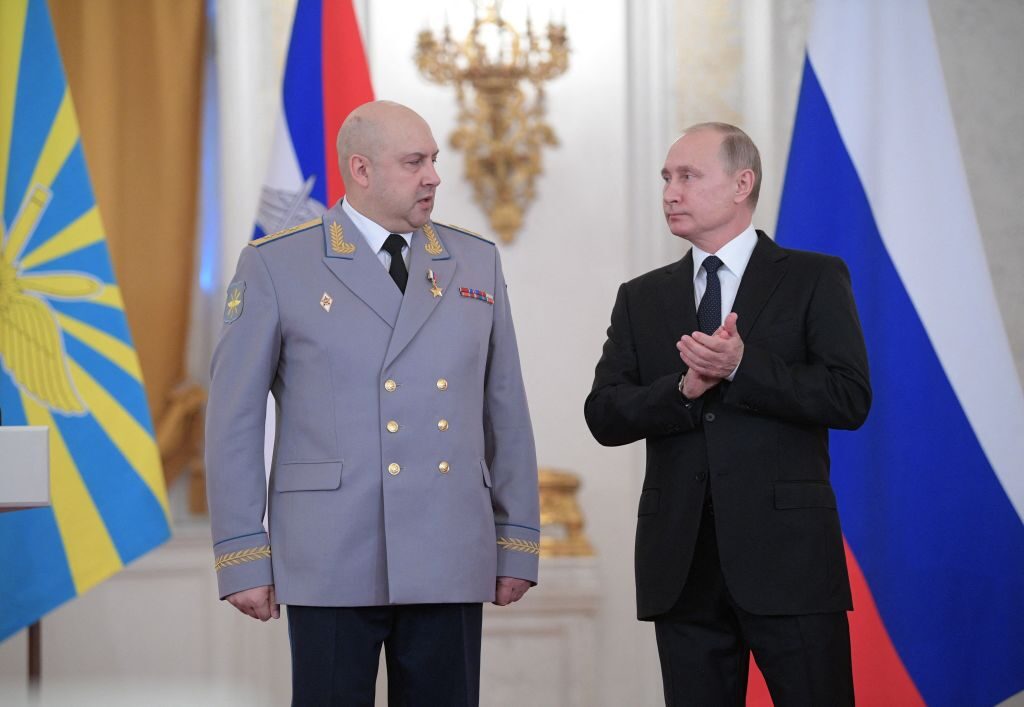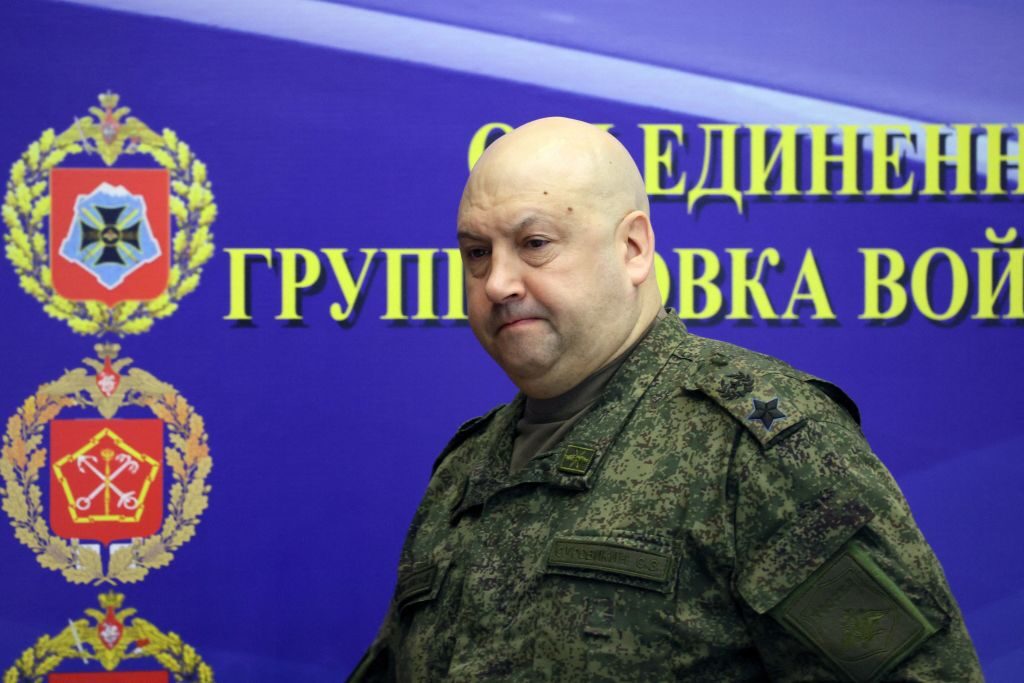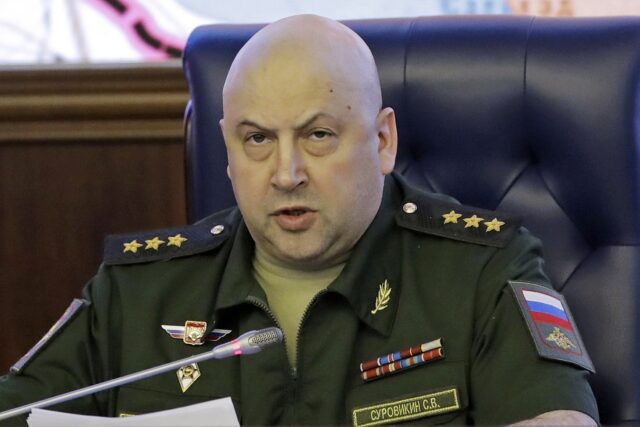A senior Russian lawmaker ominously told reporters on Wednesday that General Sergei Surovikin, a top Russian military leader who has not been seen in public since the Wagner Private Military Company (PMC) staged a brief uprising against the Russian armed forces in late June, was “currently resting.”
Surovikin had long enjoyed a prestigious career in the Russian military and commanded Russian operations in the ongoing invasion of Ukraine from October 2022 to January. Prior to his disappearance, he was known to maintain friendly ties to Wagner, a mercenary organization, and its leader, Yevgeny Prigozhin.
Prigozhin led Wagner’s operations in Ukraine for months, tallying up significant victories in comparison to the anemic efforts of the formal Russian military, and spent months using his Telegram social media channel to condemn Russian Defense Minister Sergei Shoigu and the heads of the Russian military.
On June 23, Prigozhin claimed in a social media message that the Russian military had attacked Wagner forces, allegedly killing 2,000 fighters, and that he would march thousands of soldiers out of Ukraine towards Moscow for a “march for justice” in retaliation. The Russian government immediately responded by charging Prigozhin with “armed uprising” and declaring his march an attempted coup, despite repeated assurances from Prigozhin that he supported Russian leader Vladimir Putin and that his dispute was with Shoigu.
Less than 24 hours later, Belarusian communist dictator Alexander Lukashenko announced he had brokered a deal between Moscow and Prigozhin to stop the Wagner invasion of the nation’s capital, in exchange for exile for Prigozhin to Belarus and the dropping of criminal charges. The Russian government returned upwards of $110 million worth of loot confiscated to Prigozhin and Putin himself reportedly met with the Wagner warlord in person following the revolt – and offered him a job.

File/In this picture taken on December 28, 2017 Russian President Vladimir Putin presents an award to Colonel General Sergei Surovikin, the commander of Russian troops in Syria, during a ceremony to bestow state awards on military personnel who fought in Syria, at the Kremlin in Moscow. ((ALEXEY DRUZHININ/SPUTNIK/AFP via Getty Images)
Surovikin disappeared from the public eye somewhere amid the chaos of the mutiny. Russians last saw him in a Telegram message on the day of the Wagner mutiny in which he implored Prigozhin to stop his march.
“We fought together with you, took risks, we won together,” Surovikin said in the message, addressing Prigozhin. “We are of the same blood, we are warriors. I urge you to stop.”
The tone of the message resulted in reports comparing it to a “hostage” message and speculating that Surovikin appeared “drunk.”
The Kremlin has repeatedly denied that he was arrested or is in state custody, but has not clarified his whereabouts, leading to speculation that he is in government custody, potentially because he privately supported the mutiny.
On Wednesday, Andrey Kartapolov, head of the Russian State Duma Defense Committee, insisted Surovikin was just “resting.”
“Surovikin is currently resting. [He is] not available for now,” Kartapolov told reporters in a video circulating on Russian social media. The lawmaker reportedly did not elaborate.
The Emirati newspaper The National reported on Wednesday that Surovikin’s deputy, Russian Aerospace Forces Chief of Staff Col. Gen. Viktor Afzalov, appeared in a Russian military briefing Chief of General Staff Gen. Valery Gerasimov, a job that would normally have gone to Surovikin. The newspaper cited “British military intelligence” for Surovikin’s absence at that meeting.
Kartapolov’s comment is the first public remark by a Russian official regarding Surovikin since late June, when top Kremlin spokesman Dmitry Peskov dismissed rumors of his disappearance in late June, following the aborted mutiny and the bizarre message Surovikin posted in the brief hours when the uprising was ongoing.
“I think that now there will be a lot of gossip, speculation on this issue [the armed mutiny] and so on. I think this is one of such examples,” Peskov said according to the Russian news agency Tass, without elaborating.
Similarly, Alexey Melnikov, the secretary of the Public Monitoring Committee, insisted on June 29 that Surovikin had not been detained.

File/Russian General Sergei Surovikin, commander of Russia’s military operation in Ukraine is seen during a visit of Russian President to the joint staff of troops involved in Russia’s military operation in Ukraine in an undisclosed place on December 17, 2022. (GAVRIIL GRIGOROV/Sputnik/AFP via Getty)
“Representatives of a large number of Russian and foreign media have been calling me quite often in recent days. They ask: ‘Is it true that Surovikin is in pre-trial detention?’ I answer: he is not in Lefortovo or any other pre-trial detention center,” he said, according to Tass.
In his statements to the press, Peskov denied that Surovikin – or anyone in Russia – supported Prigozhin.
“The army and the people, everyone was by the president’s side,” Peskov insisted.
According to sources speaking to the Moscow Times shortly after the Wagner mutiny, Surovikin was at least perceived to be on Prigozhin’s side.
“Apparently, he [Surovikin] chose Prigozhin’s side during the uprising, and they’ve gotten him by the balls,” an anonymous source told the newspaper. Other sources also claimed that Surovikin’s disappearance was “in the context of Prigozhin.”
Surovikin’s disappearance is one of several dramatic incidents involving Russian generals since the Wagner mutiny. Late on Wednesday, audio surfaced on Telegram allegedly of Major General Ivan Popov, a top general who claimed that he had been fired from his leadership position because he criticized what he considered incompetence by Defense Minister Sergei Shoigu in handling the invasion of Ukraine.
“As many commanders said today, our army could not be penetrated by the Ukrainian Armed Forces on the frontline, it was hit from the rear by our senior chief, treacherously and nefariously decapitating the army at the most difficult and tense moment,” the man claiming to be Popov said in the message. He claimed Shoigu personally gave the order to “get rid of” him for not giving his soldiers enough weaponry to properly fight: “a lack of counter-battery fire, a lack of artillery reconnaissance stations and the mass deaths and injuries of our brothers by enemy artillery.”
Prior to the emerging Popov scandal, the Russian government, as well as Ukraine’s, confirmed the death of a Russian general, Lieutenant General Oleg Tsokov, while fighting in eastern Ukraine.
Follow Frances Martel on Facebook and Twitter.

COMMENTS
Please let us know if you're having issues with commenting.